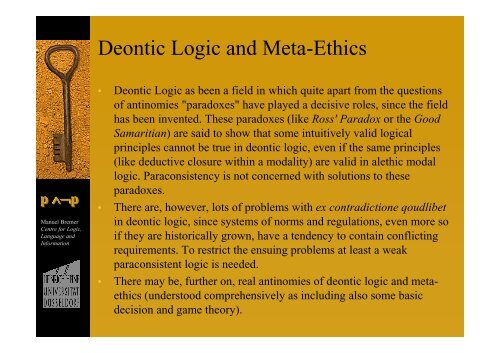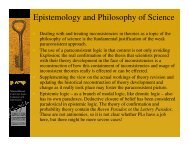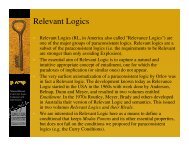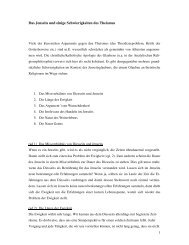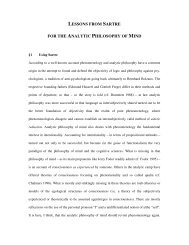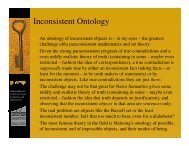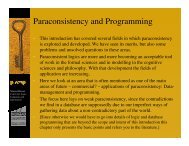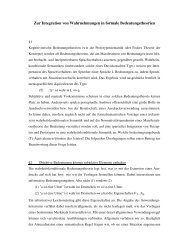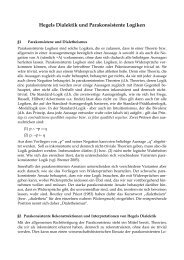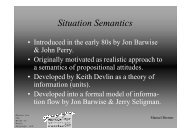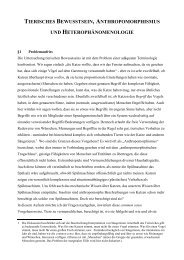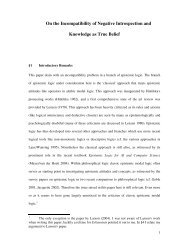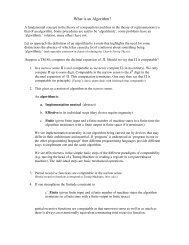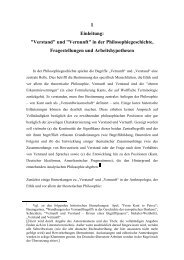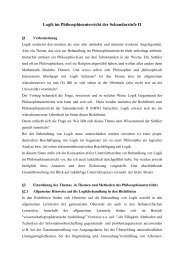Deontic Logic and Meta-Ethics - Bremer
Deontic Logic and Meta-Ethics - Bremer
Deontic Logic and Meta-Ethics - Bremer
You also want an ePaper? Increase the reach of your titles
YUMPU automatically turns print PDFs into web optimized ePapers that Google loves.
p ∧¬<br />
∧¬ ∧¬p ∧¬ ∧¬<br />
∧¬<br />
∧¬<br />
Manuel <strong>Bremer</strong><br />
Centre for <strong>Logic</strong>,<br />
Language <strong>and</strong><br />
Information<br />
<strong>Deontic</strong> <strong>Logic</strong> <strong>and</strong> <strong>Meta</strong>-<strong>Ethics</strong><br />
<strong>Deontic</strong> <strong>Logic</strong> as been a field in which quite apart from the questions<br />
of antinomies "paradoxes" have played a decisive roles, since the field<br />
has been invented. These paradoxes (like Ross' Paradox or the Good<br />
Samaritian) are said to show that some intuitively valid logical<br />
principles cannot be true in deontic logic, even if the same principles<br />
(like deductive closure within a modality) are valid in alethic modal<br />
logic. Paraconsistency is not concerned with solutions to these<br />
paradoxes.<br />
There are, however, lots of problems with ex contradictione qoudlibet<br />
in deontic logic, since systems of norms <strong>and</strong> regulations, even more so<br />
if they are historically grown, have a tendency to contain conflicting<br />
requirements. To restrict the ensuing problems at least a weak<br />
paraconsistent logic is needed.<br />
There may be, further on, real antinomies of deontic logic <strong>and</strong> metaethics<br />
(understood comprehensively as including also some basic<br />
decision <strong>and</strong> game theory).
p ∧¬<br />
∧¬ ∧¬p ∧¬ ∧¬<br />
∧¬<br />
∧¬<br />
Manuel <strong>Bremer</strong><br />
Centre for <strong>Logic</strong>,<br />
Language <strong>and</strong><br />
Information<br />
Inconsistent Obligations<br />
It often may happen that one is confronted with inconsistent<br />
obligations.<br />
Consider for example the rule that term papers have to be h<strong>and</strong>ed in at<br />
the institute's office one week before the session in question combined<br />
with the rule that one must not disturb the secretary at the institute's<br />
office if she is preparing an institute meeting. What if the date of<br />
h<strong>and</strong>ing in your paper falls on a day when an institute meeting is<br />
prepared?<br />
Entering the office is now obligatory (i.e. it is obligatory that it is the<br />
case that N.N. enters the office, O(p)), <strong>and</strong> at the same time it is<br />
forbidden (i.e. it is obligatory that it is not the case that N.N. enters the<br />
office, O(¬p)).<br />
Now, in st<strong>and</strong>ard <strong>Deontic</strong> <strong>Logic</strong> we have a conjunction principle<br />
(1) |⎯O(p ∧ q) ≡ O(p) ∧ O(q)<br />
If two states are each obligatory, then it is obligatory to have them both<br />
realised.<br />
Given principle (1) <strong>and</strong> our little story about papers we get:
p ∧¬<br />
∧¬ ∧¬p ∧¬ ∧¬<br />
∧¬<br />
∧¬<br />
Manuel <strong>Bremer</strong><br />
Centre for <strong>Logic</strong>,<br />
Language <strong>and</strong><br />
Information<br />
Inconsistent Obligations (II)<br />
(2) O(p ∧¬p)<br />
Since st<strong>and</strong>ard <strong>Deontic</strong> <strong>Logic</strong>s are extensions of st<strong>and</strong>ard logic, they<br />
include ex contradictione qoudlibet<br />
(3) |⎯(p ∧¬p) ⊃ q<br />
As normal modal logics st<strong>and</strong>ard <strong>Deontic</strong> <strong>Logic</strong>s contain their<br />
equivalent to the rule of necessitation<br />
(4) |⎯A ⇒ |⎯O(A)<br />
<strong>and</strong> the distribution equivalent to the (K)-Axiom<br />
(5) |⎯O(p ⊃ q) ⊃ (O(p) ⊃ O(q))<br />
Given the normal character of <strong>Deontic</strong> <strong>Logic</strong> we get<br />
(6) |⎯O((p ∧ ¬p) ⊃ q)<br />
(7) |⎯O(p ∧¬p) ⊃ O(q)<br />
<strong>and</strong> thus with (2) <strong>and</strong> Modus Ponens<br />
(8) |⎯O(q)<br />
for any sentence "q" whatsoever!
p ∧¬<br />
∧¬ ∧¬p ∧¬ ∧¬<br />
∧¬<br />
∧¬<br />
Manuel <strong>Bremer</strong><br />
Centre for <strong>Logic</strong>,<br />
Language <strong>and</strong><br />
Information<br />
Inconsistent Obligations (III)<br />
Thus having an inconsistent normative system – as it happens all the<br />
day – makes it obligatory to do whatever you like (burning the term<br />
paper, blowing up the university ...).<br />
This is unbearable. And that – fortunately – is not how we reason is<br />
these situations. In the example given there may be easy solutions, but<br />
in normative systems that have a long history the conflicts <strong>and</strong> the<br />
ways to resolve them are not so obvious (the existence of higher<br />
courts to solve such conflicts is witness to this).<br />
Given that we have not resolved the conflicts yet the underlying logic<br />
has to be a paraconsistent one.<br />
The question is, where paraconsistency has to intervene. Should the<br />
underlying logic of the non-deontic language (i.e. PC) be changed thus<br />
that we no longer have Explosion or similar rules? Or should the<br />
behaviour of sentences within the scope of deontic operators be<br />
changed, maybe by giving up the additivity of "O( )"?
p ∧¬<br />
∧¬ ∧¬p ∧¬ ∧¬<br />
∧¬<br />
∧¬<br />
Manuel <strong>Bremer</strong><br />
Centre for <strong>Logic</strong>,<br />
Language <strong>and</strong><br />
Information<br />
St<strong>and</strong>ard <strong>Deontic</strong> <strong>Logic</strong><br />
We ask ask ourselves if we want to drop any of the principles of<br />
st<strong>and</strong>ard <strong>Deontic</strong> <strong>Logic</strong>. These are:<br />
(DF) F(A) := O(¬A)<br />
(DP) P(A) := ¬O(¬A)<br />
(A1) ¬(O(p) ∧ O(¬p)) [Consistency of Obligation]<br />
(A2) O(p) ∧ O(q) ≡ O(p ∧ q) [Additivity of Obligation]<br />
(A3) O(T) [Inconsistency is forbidden]<br />
Rules: Uniform Substitution <strong>and</strong> Modus Ponens.<br />
Consistency assumption are built into st<strong>and</strong>ard <strong>Deontic</strong> <strong>Logic</strong>. By (A3)<br />
<strong>and</strong> (DF) we have that inconsistency is forbidden, <strong>and</strong> it is<br />
axiomatically dem<strong>and</strong>ed that we have no inconsistent obligations by<br />
(A1). Presumably both (A1) <strong>and</strong> (A3) have to be modified.<br />
In st<strong>and</strong>ard <strong>Deontic</strong> <strong>Logic</strong> we have a derived (K)-rule <strong>and</strong> its<br />
contrapositive:<br />
|⎯ (A ⊃ B) ⇒ |⎯ (O(A) ⊃ O(B))<br />
|⎯ F(B), |⎯ (A ⊃ B) ⇒ |⎯F(A)
p ∧¬<br />
∧¬ ∧¬p ∧¬ ∧¬<br />
∧¬<br />
∧¬<br />
Manuel <strong>Bremer</strong><br />
Centre for <strong>Logic</strong>,<br />
Language <strong>and</strong><br />
Information<br />
St<strong>and</strong>ard PL Application to Obligations<br />
The former strategy of changing the underlying logic may be<br />
considered the st<strong>and</strong>ard application of a PL to questions of obligation.<br />
If the underlying logic of the normative language is changed to, say,<br />
SKP, then Explosion is no longer valid, <strong>and</strong> the argument given above<br />
does no longer go through.<br />
The principles we find in st<strong>and</strong>ard <strong>Deontic</strong> <strong>Logic</strong> don't have to be<br />
changed then.<br />
Syntactically this approach works by adding formation rules, axioms<br />
<strong>and</strong> rules for deontic operators to a paraconsistent logic.<br />
["O(A)" with unneeded brackets dropped becomes "OA".]<br />
Semantically the typical truth condition of st<strong>and</strong>ard <strong>Deontic</strong> <strong>Logic</strong> for<br />
"O( )" can be taken over, even more so if the paraconsistent system has<br />
a modal semantic already.<br />
Note that this approach can deal with the occurence of O(A) <strong>and</strong><br />
¬O(A) as both true at the propositional level, since Explosion does not<br />
ensue by O(A) ∧¬O(A).
p ∧¬<br />
∧¬ ∧¬p ∧¬ ∧¬<br />
∧¬<br />
∧¬<br />
Manuel <strong>Bremer</strong><br />
Centre for <strong>Logic</strong>,<br />
Language <strong>and</strong><br />
Information<br />
St<strong>and</strong>ard Semantics of Obligations<br />
The paraconsistent treatment of deontic conflicts takes over the<br />
st<strong>and</strong>ard semantics of st<strong>and</strong>ard <strong>Deontic</strong> <strong>Logic</strong>. (This is the easier when<br />
the underlying paraconsistent logic has already a modal semantics.)<br />
One needs a (further) deontic accessibility relation between worlds<br />
thus that S(w,w') holds if w' is relative to w a normatively optimal<br />
world.<br />
"O(A)" is true at w if <strong>and</strong> only if in all worlds w' such that S(w,w') "A"<br />
is true in w' (... false iff in some world w' with S(w,w') "A" is false).<br />
If permission is not defined in the usual way [P(A) := ¬O(¬A)] one<br />
can give the basic truth condition as:<br />
"P(A) is true at w if <strong>and</strong> only if in some world w' such that S(w,w') "A"<br />
is true in w'. (... false iff in all worlds w' with S(w,w') "A" is false).<br />
Optimal worlds are intuitively those worlds where everything that<br />
should be the case is the case, <strong>and</strong> everything that is the case isn't bad.<br />
Note that in case of inconsistent obligation we have at least one<br />
inconsistent deontic optimal world w' with A <strong>and</strong> ¬A true at w' for<br />
some A.
p ∧¬<br />
∧¬ ∧¬p ∧¬ ∧¬<br />
∧¬<br />
∧¬<br />
Manuel <strong>Bremer</strong><br />
Centre for <strong>Logic</strong>,<br />
Language <strong>and</strong><br />
Information<br />
St<strong>and</strong>ard Semantics of Obligations (II)<br />
The deontic accessibility relation cannot be reflexive, since otherwise<br />
we had:<br />
OA ⊃ A<br />
which – unfortunately – is not the case.<br />
Iterations of deontic operators are also controversial. Thus it is<br />
questionable whether S should be transitive, since this leads to:<br />
OA ⊃ OOA<br />
The two basic conditions on S are that<br />
(i) S is serial: (∀w)(∃w')S(w,w'). Seriality means that no world is a<br />
deontic dead end. It makes<br />
OA ⊃ PA<br />
true. [Remember again the parallel to alethic accessibility conditions.]<br />
(ii) S is almost reflexive: (∀w,w')(S(w,w') ⊃ S(w',w')). Almost<br />
Reflexivity means that no new obligations are violated by doing what<br />
is obligatory. It makes true:<br />
O(OA ⊃ A)<br />
Something that should hold.
p ∧¬<br />
∧¬ ∧¬p ∧¬ ∧¬<br />
∧¬<br />
∧¬<br />
Manuel <strong>Bremer</strong><br />
Centre for <strong>Logic</strong>,<br />
Language <strong>and</strong><br />
Information<br />
Inconsistent Obligations in a Consistent<br />
World<br />
Casey McGinnis takes the later option of keeping the underlying<br />
st<strong>and</strong>ard logic: The basic idea is to have a logic that can deal with<br />
normative conflicts, but makes no further changes in logic, especially<br />
not at the non-modal level of ordinary sentences. So the world is<br />
considered to be consistent, therefore PC can be applied in its full<br />
strength. Obligations may be inconsistent, so the logic within the scope<br />
of deontic operators has to be a paraconsistent logic.<br />
This approach assumes:<br />
- the world is consistent<br />
- obligations may be inconsistent<br />
- additivity of obligations <strong>and</strong> other intuitive principles should<br />
hold<br />
- there may be gaps with respect to obligation (i.e. states such<br />
that O(A) is neither true or false, or at least that neither of O(A)<br />
<strong>and</strong> O(¬A) is true).
p ∧¬<br />
∧¬ ∧¬p ∧¬ ∧¬<br />
∧¬<br />
∧¬<br />
Manuel <strong>Bremer</strong><br />
Centre for <strong>Logic</strong>,<br />
Language <strong>and</strong><br />
Information<br />
Inconsistent Obligations in a Consistent<br />
World (II)<br />
The idea of keeping the logic within the deontic operators apart from<br />
the underlying logic is modelled by keeping PC at the non-modal level<br />
<strong>and</strong> having BN4 [see Chap.9] at the deontic level. The system is called<br />
SPDL (for "Semi-Paraconsistent <strong>Deontic</strong> <strong>Logic</strong>").<br />
SDPL like SKP singles out a "home world" w0 as the starting point of<br />
accessibility. w0 is required to be consistent <strong>and</strong> complete, i.e. atomic<br />
sentences receive either {0} or {1} as truth value. { } or {1,0} occur<br />
only at worlds different from w0 . Semantic consequence is truth<br />
preservation at w0 . "P" is not defined in terms of "O".<br />
The semantic rules have to ensure that inconsistency does not travel<br />
back from an accessible world via the rules of "O" into the home<br />
world: If a w0-accessible world is inconsistent for A, then – according<br />
to the st<strong>and</strong>ard semantic rule for "O" given above – OA is true at w0 <strong>and</strong> false at w0 , <strong>and</strong> O(¬A) is true at w0 . So there would be sentences<br />
with non-st<strong>and</strong>ard values at w0 .<br />
This problem can be solved by invoking a double st<strong>and</strong>ard in revising<br />
the falsity conditions of the st<strong>and</strong>ard semantics of "O" <strong>and</strong> "P".
p ∧¬<br />
∧¬ ∧¬p ∧¬ ∧¬<br />
∧¬<br />
∧¬<br />
Manuel <strong>Bremer</strong><br />
Centre for <strong>Logic</strong>,<br />
Language <strong>and</strong><br />
Information<br />
Inconsistent Obligations in a Consistent<br />
World (III)<br />
The revised rules are:<br />
(SO) 0∈v("OA",w) iff (w = w 0 <strong>and</strong> 1∉v("OA",w)) or<br />
(w ≠ w 0 <strong>and</strong> (∃w')S(w,w') <strong>and</strong> 0∈v("A",w'))<br />
(SP) 0∈v("PA",w) iff (w = w 0 <strong>and</strong> 1∉v("PA",w)) or<br />
(w ≠ w 0 <strong>and</strong> (∀w')(S(w,w') ⊃ 0∈v("A",w')))<br />
[The parts for 1∈v("OA",w) <strong>and</strong> 1∈v("PA",w) remain the same.]<br />
Now one can prove that at w 0 all sentences are bivalent. (Look at the<br />
BN4 truth tables for binary values <strong>and</strong> (S0) <strong>and</strong> (SP) above.)<br />
The Deduction Theorem holds for SPDL.<br />
Provable equivalents cannot be substituted for each other in SPDL,<br />
since in PC all contradictions are provably equivalent, but<br />
O(p ∧¬p) need not say the same as O(q ∧¬q), <strong>and</strong> the presence of<br />
deontic conjunction elimination would lead to deontic explosion.<br />
SPDL is not a normal modal logic, i.e. neither do "oughtification" for<br />
any tautology nor the (K)-rule hold: |⎯SPDL T <strong>and</strong> |⎯/⎯SPDL OT.
p ∧¬<br />
∧¬ ∧¬p ∧¬ ∧¬<br />
∧¬<br />
∧¬<br />
Manuel <strong>Bremer</strong><br />
Centre for <strong>Logic</strong>,<br />
Language <strong>and</strong><br />
Information<br />
SPDL Theorems<br />
SPDL has as theorems:<br />
(T1) P(p ∧ q) ⊃ Pp ∧ Pq<br />
(T2) Op ⊃ Pp<br />
(T3) O(p ⊃ q) ⊃ (Op ⊃ Oq)<br />
(T4) O(p ⊃ Pp)<br />
(T5) OOp ⊃ Op<br />
(T6) O(p ∧ q) ≡ Op ∧ Oq<br />
(T7) P(p ∨ q) ≡ Pp ∨ Pq<br />
SPDL invalidates:<br />
(*1) Op ⊃ OOp<br />
(*2) Pp ⊃ OPp<br />
(*3) Op ⊃ O(q ⊃ p)<br />
(*4) O(p ∨¬p)<br />
(*5) F(p ∧¬p)<br />
(*6) ¬O(p ∧¬p)<br />
(*7) Pp ∨ P¬p
p ∧¬<br />
∧¬ ∧¬p ∧¬ ∧¬<br />
∧¬<br />
∧¬<br />
Manuel <strong>Bremer</strong><br />
Centre for <strong>Logic</strong>,<br />
Language <strong>and</strong><br />
Information<br />
SPDL Explosion<br />
Note: Explosion holds in SPDL (since it has PC as underlying logic).<br />
Normative conflicts of the sort OA ∧ O(¬A) can be solved by SPDL<br />
<strong>and</strong> lead neither to deontic explosion nor to general explosion.<br />
If, however, we had OA ∧ ¬OA this would be a case of an ordinary<br />
contradiction (at the home world) <strong>and</strong> would by the validity of<br />
Explosion allow to infer any B whatsoever!<br />
The occurence of this problem is softened by not having PA ≡ ¬O¬A,<br />
such that the observation of a permission to ¬A does not in<br />
conjunction with the norm to have A realized lead to everything. Thus<br />
the question is, whether we could ordinarily come into situations where<br />
we can ascertain that OA <strong>and</strong> can ascertain <strong>and</strong> ¬OA.<br />
It seems to me that we can: Imagine a situation where there are two<br />
sources of laws/rules, one dem<strong>and</strong>ing A the other being quiet on A.<br />
The absence of PA ≡ ¬O¬A also deviates from our ordinary notion of<br />
permission, as does the absence of PA ∨ P(¬A).<br />
These may be reasons to have a paraconsistent logic also as the<br />
underlying logic in deontic reasoning.
p ∧¬<br />
∧¬ ∧¬p ∧¬ ∧¬<br />
∧¬<br />
∧¬<br />
Manuel <strong>Bremer</strong><br />
Centre for <strong>Logic</strong>,<br />
Language <strong>and</strong><br />
Information<br />
Questions<br />
(Q1) The case of inconsistent obligations, is that a case of<br />
weak paraconsistency or of strong paraconsistency, <strong>and</strong><br />
what does the answer to this question depend upon?<br />
(Q2) What does Almost Reflexivity correspond to in alethic<br />
modal logic (respectively the logic of provability)?
p ∧¬<br />
∧¬ ∧¬p ∧¬ ∧¬<br />
∧¬<br />
∧¬<br />
Manuel <strong>Bremer</strong><br />
Centre for <strong>Logic</strong>,<br />
Language <strong>and</strong><br />
Information<br />
Exercises<br />
(Ex1) That some thing is forbidden means that its negation is<br />
obligatory. Consider the deontic necessitation rule<br />
|⎯A ⇒ |⎯O(A)<br />
Why does it say that is forbidden to realise something<br />
inconsistent (given the background of st<strong>and</strong>ard logic)?<br />
(Ex2) If in SPDL one did not revise the falsity condition of<br />
"O", but required 0∈v("OA",w) ⇔ 1∉ v("OA",w) –<br />
why does this make<br />
O(OA ⊃ A)<br />
invalid? [Draw an accessibility diagram.]<br />
(Ex3) Show for some of the SPDL theorems/non-theorems<br />
why they are valid/invalid.
p ∧¬<br />
∧¬ ∧¬p ∧¬ ∧¬<br />
∧¬<br />
∧¬<br />
Manuel <strong>Bremer</strong><br />
Centre for <strong>Logic</strong>,<br />
Language <strong>and</strong><br />
Information<br />
Further Reading<br />
An introduction to <strong>Deontic</strong> <strong>Logic</strong> in general is: Aqvist, Lennart.<br />
Introduction to <strong>Deontic</strong> <strong>Logic</strong> <strong>and</strong> the Theory of Normative Systems.<br />
Neapels, 1987. The deontic "paradoxes" are also dealt with there, as<br />
well as Diadic <strong>Deontic</strong> <strong>Logic</strong>, which takes conditional obligation to be<br />
formalized by "O(A/B)" instead of "B ⊃ OA".<br />
A little overview on the basic systems <strong>and</strong> there semantics you find at:<br />
http://manuel.bremer.bei.t-online.de/SDL.pdf<br />
http://manuel.bremer.bei.t-online.de/DyDL.pdf<br />
(in German).<br />
Casey McGinnis' ideas are taken from his forthcoming PhD thesis<br />
Paraconsistency <strong>and</strong> <strong>Deontic</strong> <strong>Logic</strong>, (2004). McGinnis also gives a<br />
tableau style proof system for BN4 <strong>and</strong> its deontic application.


